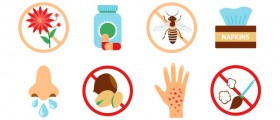
Drug allergy is an allergy to any kind of drug. Most commonly, people are allergic to various medications, and allergic reactions, experienced upon the intake of these substances, can be very severe and potentially fatal. It is important to understand the severity and potential hazards of drug allergies and immediately seek medical help if any kind of allergic reaction to medication is suspected. Most allergy drugs respond well to treatment, but it is still necessary to receive treatment on time.
Drug allergy vs. drug intolerance
Drug allergy occurs when the body’s immune system reacts to a medication. In some cases, people will experience an allergic reaction on the first administration to the drug. However, it is not common for a drug allergy to occur on the first exposure to the substance. This is because a human body generates antibodies for the antigen, as a foreign invader. Some individuals may also experience just drug intolerance, a mild and non-immune reaction to the drug. Allergic and non-allergic reactions are commonly confused, since both of them cause similar symptoms. The main difference between them is that only a drug allergy involves the immune system. However, they both need to be checked with a doctor in order to avoid serious and life-threatening complications.
Symptoms of a drug allergy
First symptoms of drug allergy may start right after taking the drug. In some rare cases, drug allergy will occur a couple of days, or even weeks following a drug intake. Skin rash is usually first of the symptoms to show up. It is followed by hives, facial swelling, fever, respiratory problems and dizziness. In rare cases, patients may experience anaphylaxis, which the most severe allergic drug reaction, medical emergency and a life-threatening situation. Symptoms of drug anaphylaxis include extreme troubles with breathing, very weak but rapid pulse, severe drop in blood pressure, nausea, vomiting, dizziness, lightheadedness or loss of consciousness.
Risk factors
As for any other kind of allergy, it is hard to determine any kind of definite set of risk factors. A drug allergy is more likely to develop if a person is taking a medication for a long time and in large doses. Taking several drugs at the time, or taking a drug similar to one that caused allergic reactions in the past, is also considered risky. People suffering from other allergies, as well as those with a weak immune system, are more likely to develop a new allergy.
Moreover, certain medications are considered more common drug allergens than the others. For example, most common drug allergens are penicillin, sulfa drugs, codeine, non-steroidal anti-inflammatory drugs, phenytoin, etc.

















Your thoughts on this
Loading...